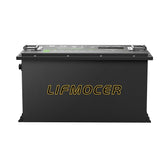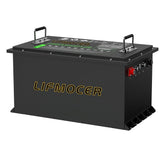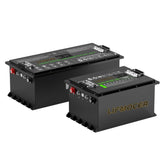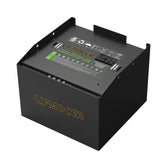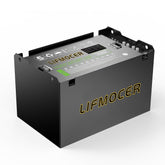How to Extend Lithium Battery Life: 7 Proven Tips
Lithium batteries are widely used in golf carts, forklifts, solar systems and other equipment, and have become the core of modern power supply. However, in actual use, many users inadvertently accelerate battery loss and shorten its life due to incorrect maintenance habits. In this guide, we'll explore seven practical tips to help you scientifically maintain lithium battery, effectively extend lithium battery life, and ensure their long-term performance and safety.
1. Avoid Overcharging and Deep Discharging
Many users have misunderstandings when using lithium batteries. The most common one is to frequently charge the battery to 100% or drain it to zero.In fact, this extreme charging and discharging behavior results in a high battery depth of discharge, which accelerates the aging of electrode materials and leads to faster cell degradation. Scientific research shows that maintaining the battery power in the range of 20% - 80% can effectively stabilize the internal chemical activity of the battery and significantly prolong the battery lifespan.
2. Use the Right Charger
Be sure to use a charger designed specifically for lithium batteries. Using non-adaptive or low-quality chargers can cause battery overheating, unsafe charging voltage, and even internal damage. To ensure the safety of lithium batteries, it is recommended to choose a smart charger with automatic power-off and temperature monitoring functions. Such products can quickly cut off the power when the battery is full or the temperature is abnormal, effectively reducing safety hazards.
3. Store Batteries in a Cool, Dry Place
High temperatures are the enemy of lithium batteries. When lithium batteries are exposed to high temperatures above 35°C (95°F) for a long time, their performance will accelerate and the battery capacity will be significantly reduced. To maintain the good performanceimprove lithium battery longevity, the ideal storage environment temperature should be controlled between 10°C - 25°C (50°F - 77°F) with low humidity. In daily use, be sure to avoid placing lithium batteries in direct sunlight, closed garages, or vehicles parked at high temperatures.

4. Keep Battery Terminals Clean
Although lithium batteries are sealed, dirty or oxidized terminals can cause increased resistance, heat buildup, and reduced charging efficiency. It is recommended to wipe the lithium battery terminals with a dry cloth or a small amount of rubbing alcohol every few months to remove surface stains and oxides in time to ensure smooth current transmission,so as to make the lithium battery last longer.
5. Don't Leave Batteries Idle for Too Long
For long-term battery storage, if the lithium battery is not used for a long time, it will cause capacity loss. If the battery is not used for a long time, it needs to be charged every 2-3 months. Charging the battery to about 50% can not only avoid over-discharge of the battery, but also reduce aging caused by long-term full charge. It is a more ideal storage power state.
6. Monitor Battery Health with Smart Tools
Today, many modern lithium batteries have a built-in BMS (battery management system). Through the supporting app or display device, users can monitor key parameters such as battery voltage, temperature, and number of charge-discharge cycles in real time. Abnormal data that can be discovered in time can effectively prevent damage and ensure optimal operation.
7. Follow Manufacturer Guidelines
To ensure the best performance and life of your lithium battery, be sure to strictly follow the official maintenance guide of the battery manufacturer. Because lithium batteries exist in a variety of chemical systems, such as lithium iron phosphate, ternary lithium, etc., their material properties, charge and discharge curves, and temperature tolerance vary, so their maintenance requirements may be slightly different. Only by following brand-certified standard operations can you fully guarantee the performance of your equipment and maximize the value of your investment.
Conclusion
Extending the life of your lithium-ion battery doesn't have to be complicated; with proper care, lithium-ion batteries can achieve thousands of charge cycles and continue to perform reliably for years. From smart charging to seasonal storage, these seven practical, easy-to-follow tips are worth learning. Start applying these battery care strategies today to significantly maximize lithium battery performance..
FAQ
How often should I charge a lithium battery?
It's best to charge when it drops below 30% and unplug it before reaching 100%.
Can cold weather damage lithium batteries?
Yes, especially below 0°C. Always operate and store batteries in moderate temperatures.
What's the best charge level for storage?
Store at 50% in a cool, dry place if unused for over 30 days.
References
Battery University. BU-808: How to Prolong Lithium-based Batteries.


